Today I’m so excited to show you how to make the best Cheesecake Recipe of your life. Simple, classic, and no water bath required!! The texture is smooth, rich, and creamy, served over a crisp homemade graham cracker crust.
I’ve included tons of detailed tips and important info in today’s post so you can make the perfect creamy cheesecake every time. For a visual how-to, be sure to check out my step-by-step video beneath the recipe!
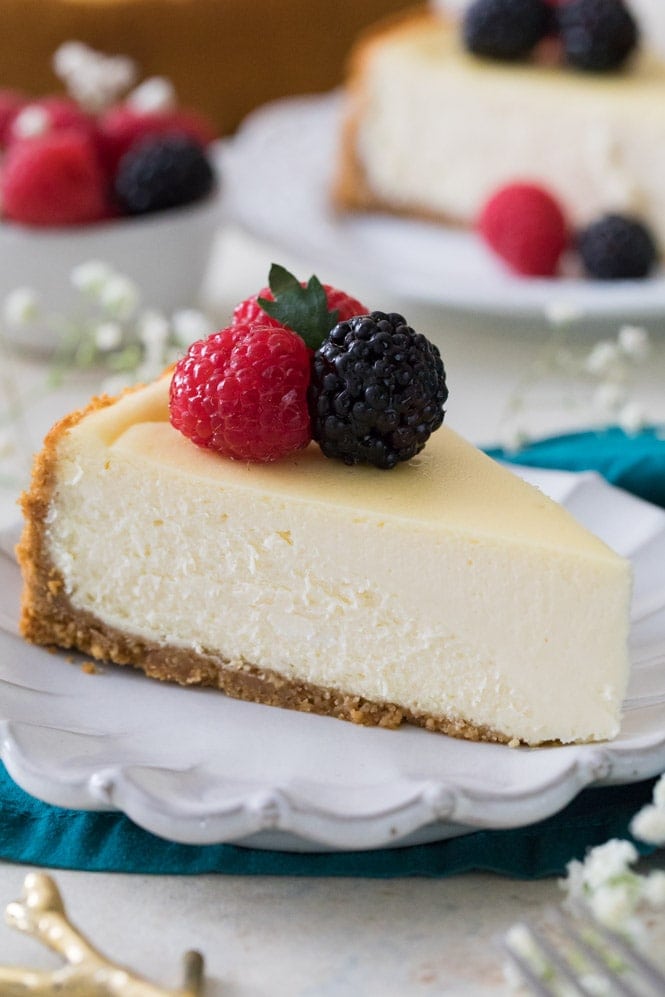
The Perfect Cheesecake Recipe
This cheesecake recipe has been a long time coming.
For a recipe with so few ingredients (cream cheese, eggs, sugar, sour cream, vanilla & salt), it took a lot longer than you might think to develop the perfect version. I’ve shared a few cheesecake variations in the past, including my No-Bake Cheesecake, but getting a perfected classic version took lots of testing. Finally, here we are.
Oh, and we are skipping the water bath! I’ve always found them to be largely unnecessary with cheesecakes. Cook yours on a low temperature and follow my tips below and you’ll have a perfectly creamy and crack-less cheesecake without all the hassle of a water bath.
Other tested/perfected classics to try: my Pound Cake, Chocolate Cake, and Carrot Cake, (to name just a handful).
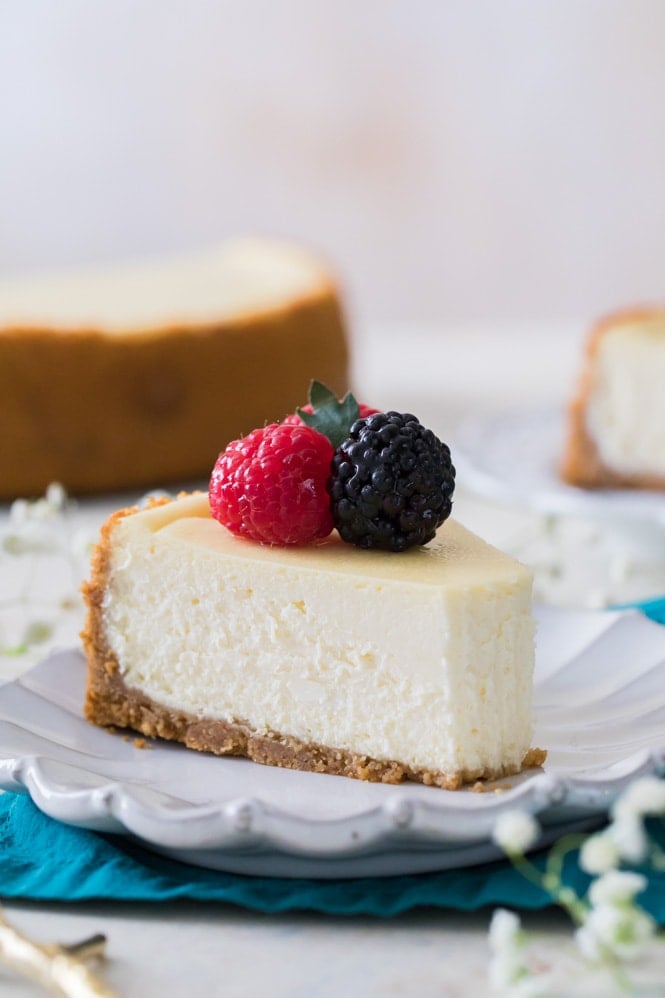
Must-Know Tips for Baking the Perfect Cheesecake (Without a Water Bath!)
Use room temperature ingredients
It’s important that your cream cheese comes to room temperature before you begin making your cheesecake. This will prevent any lumps and ensure a cheesecake with a smooth, creamy texture. However, to ensure that all of your ingredients blend together nicely and give you the desired result, they should all be at room temperature before you begin.
Take it easy on the eggs
Over-beating your eggs is one of the quickest ways to ruin a cheesecake. Over-beating can ruin the texture and can cause cracks. To prevent this, lightly scramble each egg before adding it into your batter. Keep your mixer on low speed and stir until just combined. Be sure to pause after each addition and scrape down the sides and bottom of your mixing bowl.
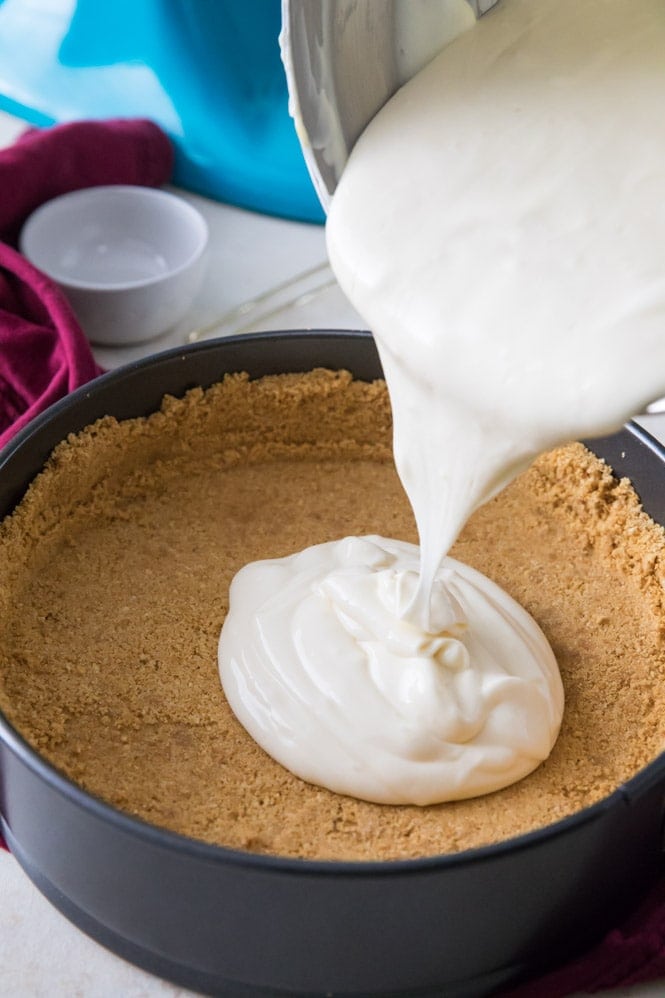
Don’t open the oven!
I know how tempting it can be to want to check on your perfect, beautiful cheesecake, but wait until it’s finished baking (or close to it) before opening the oven door! Yes, you will have to test for doneness at some point and there’s a real possibility it will need more time in the oven, but minimize opening the oven as much as possible.
Opening the oven door can drastically reduce the temperature of your oven, which will slow the baking process and might cause your cheesecake to sink or crack.
Free your crust!
Once your cheesecake is done baking, allow it to cool for 10 minutes on top of the stove. Then, run a knife around the inside of the springform pan to loosen the crust from the sides.
As your cheesecake cools, it may to shrink a bit. If the crust is stuck to the pan, your crust won’t give but your cheesecake will (leaving you with cracks). Free the crust from the sides so it can contract with your filling as needed.
Cool at room temperature before moving to the fridge
I always let my cheesecake come to room temperature before chilling. For bests results, let it cool as gradually as possible. I put mine on top of my oven (the warmest spot in my house) so it can gradually cool off as the oven does.
This pre-chilling cooling period can take an hour or two, but it’s worth it. An abrupt temperature change (moving the cheesecake directly from oven to fridge) is likely to make it crack.
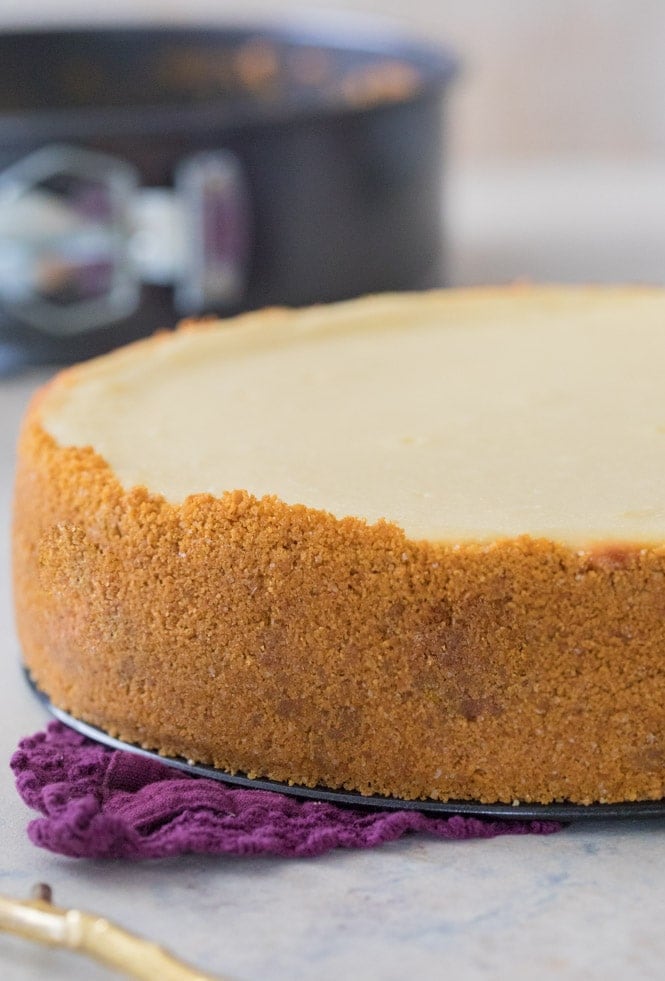
How to Store Cheesecake
Cheesecake should always be stored chilled in the refrigerator. When I’m ready to store mine, I’ll usually replace the springform ring and then cover the top with foil.
Cheesecake shouldn’t be left out at room temperature for more than 4 hours (or less if it’s particularly hot/humid!).
Can I Freeze Cheesecake?
Yes, you can freeze your cheesecake! Fortunately, this cheesecake recipe actually freezes very well. To freeze, first allow your cheesecake to cool on the stovetop and in the fridge as instructed. Once it’s chilled, you can freeze by wrapping thoroughly in plastic wrap and then wrapping in foil. Cheesecake will keep in the freezer for several months.
To thaw, transfer to the fridge and let it thaw there overnight.
Here’s a great source for more information on freezing cheesecake, including suggestions if you’d like to freeze by the slice.
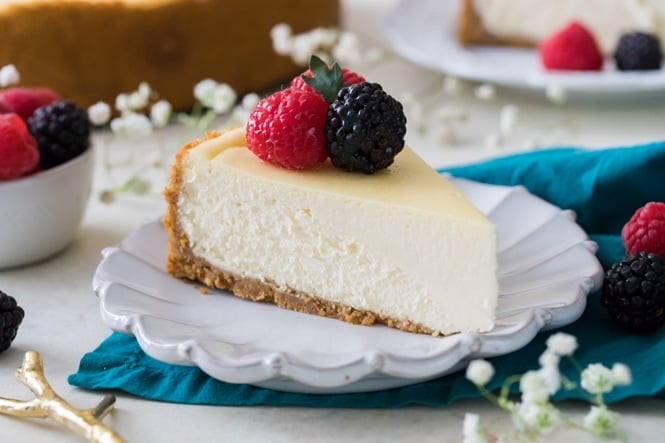
Other Cheesecake Variations You Might Like:
- Oreo Cheesecake
- Pumpkin Cheesecake
- Chocolate Cheesecake
- Or try something different and serve this cheesecake on an Oreo Crust!
Enjoy!
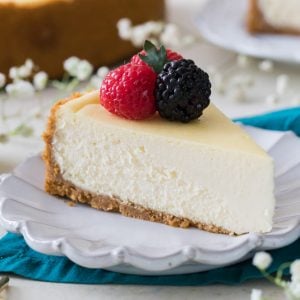
The BEST Cheesecake Recipe

Ingredients
Graham Cracker Crust¹
- 1 ½ cups graham cracker crumbs (170g)
- 2 Tablespoons sugar
- 1 Tablespoon brown sugar (can substitute white)
- 7 Tablespoons butter melted
Cheesecake
- 32 oz cream cheese² softened to room temperature (910g)
- 1 cup sugar (200g)
- ⅔ cups sour cream (160g)
- 1 ½ teaspoons vanilla extract
- ⅛ teaspoon salt
- 4 large eggs room temperature, lightly beaten
Recommended Equipment
Instructions
- Preheat oven to 325F (160C).
- Prepare Graham Cracker crust first by combining graham cracker crumbs, sugar, and brown sugar, and stirring well. Add melted butter and use a fork to combine ingredients well.1 ½ cups graham cracker crumbs, 2 Tablespoons sugar, 1 Tablespoon brown sugar, 7 Tablespoons butter
- Pour crumbs into a 9” Springform pan and press firmly into the bottom and up the sides of your pan. Set aside.
Cheesecake
- In the bowl of a stand mixer or in a large bowl (using a hand mixer) add cream cheese and stir until smooth and creamy (don’t over-beat or you’ll incorporate too much air).32 oz cream cheese²
- Add sugar and stir again until creamy.1 cup sugar
- Add sour cream, vanilla extract, and salt, and stir until well-combined. If using a stand mixer, make sure you pause periodically to scrape the sides and bottom of the bowl with a spatula so that all ingredients are evenly incorporated.⅔ cups sour cream, 1 ½ teaspoons vanilla extract, ⅛ teaspoon salt
- With mixer on low speed, gradually add lightly beaten eggs, one at a time, stirring just until each egg is just incorporated. Once all eggs have been added, use a spatula to scrape the sides and bottom of the bowl again and make sure all ingredients are well combined.4 large eggs
- Pour cheesecake batter into prepared springform pan. To insure against leaks, place pan on a cookie sheet that’s been lined with foil.
- Transfer to the center rack of your oven and bake on 325F (160C) for 50-60 minutes (or longer as needed, see note 3). Edges will likely have slightly puffed and may have just begun to turn a light golden brown and the center should spring back to the touch but will still be Jello-jiggly. Don't over-bake or the texture will suffer, which means we all suffer.
- Remove from oven and allow to cool on top of the oven⁴ for 10 minutes. Once 10 minutes has passed, use a knife to gently loosen the crust from the inside of the springform pan (this will help prevent cracks as your cheesecake cools and shrinks). Do not remove the ring of the springform pan.
- Allow cheesecake to cool another 1-2 hours or until near room temperature before transferring to refrigerator and allowing to cool overnight or at least 6 hours. I remove the ring of the springform pan just before serving then return it to the pan to store. Enjoy!
Notes
1) Graham cracker crust
For more details on making this crust or to use whole graham crackers, please see my Graham Cracker Crust Recipe.2) Cream cheese
Make sure that you use the brick-style cream cheese, not the spreadable version that is available in tubs.3)Bake time
Exact bake time can vary depending on your oven, whether you bake your cheesecake on a baking pan or not, the color of your springform pan (light or dark), and even the precise temperature of your ingredients. Because of this I recommend checking your cheesecake at 50 minutes and adding time as needed. However, it is not uncommon for the cheesecake to take as long as 75 minutes to bake, but it's better to check sooner.4) Cooling cheesecake
I recommend the top of the oven because it is usually the warmest place in my house (after it’s been on for over an hour). This will help to cool the cheesecake more gradually and will also help avoid cracks).Nutrition
Nutritional information is based on third-party calculations and should be considered an estimate only. Actual nutritional content will vary based upon brands used, measuring methods, cooking method, portion sizes, and more.

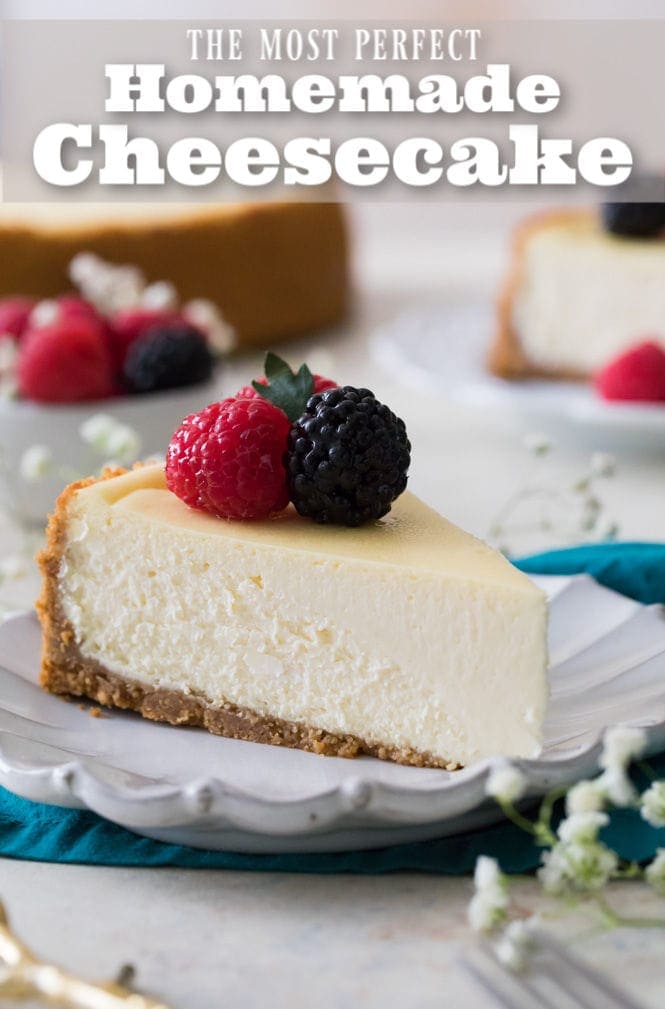
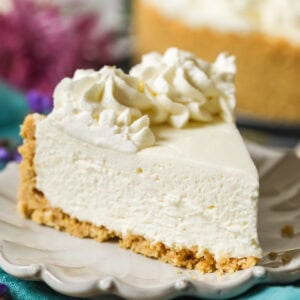
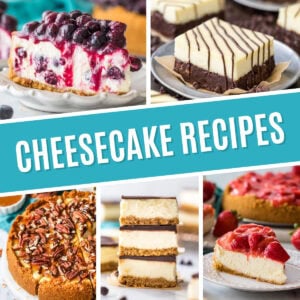
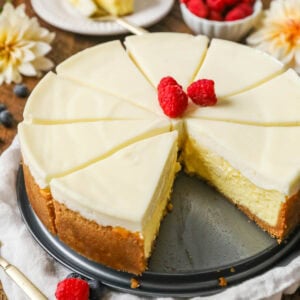
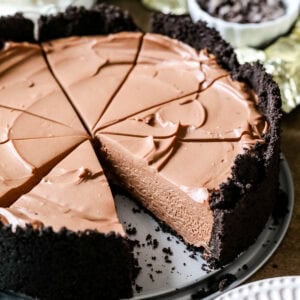
Doniel R Bur
Have you ever substituted Greek yogurt for the sour cream? Not wanting to make it “healthier”, just forgot to pick up sour cream at the store!
Emily @ Sugar Spun Run
Hi Doniel! As long as it’s full-fat Greek yogurt, it should substitute just fine 🙂
Diane C
Question:
I don’t have springform anything. I need to make 2, I have a square 8in metal pan and a 10 glass pie dish. Which should I use, and would it change bake time or temp? Thank you
Sam Merritt
Hi Diane! If you need to make 2, this should fill 2 of your pie plates. I’m not sure on a bake time. It will be reduced. You may need to increase the crust a little bit to cover both of those dishes. 🙂
Cathy
I made this a couple months ago and served it with a with a home made tart cherry sauce. It was so good. My family said it was the best cheesecake ever. Have you ever made this in muffin tins or mini muffin tins fur individual cheesecakes?
Emily @ Sugar Spun Run
We are so happy it was a hit, Cathy! Yes, we actually do that exact thing when making our mini cheesecakes 🙂
Nikk
can I add pie filling ,cherry, on top
Sam Merritt
Sure thing! 🙂
El Cartero
My hand mixer beater attachments locked up right away and destroyed the mixer when trying to mix the 4 packages of cream cheese.
Sam Merritt
Hmmm that is…interesting. Were your cream cheese bricks at room temperature? Sounds like your mixer was near it’s end life. 🙁
Nina
Hi. Can i use this recipe for mini cheesecakes?
Emily @ Sugar Spun Run
Hi Nina! Yes you can, just follow our recipe for mini cheesecakes 🙂
Sandy
Could I make this in a rectangle cake dish rather than a springform pan?
Emily @ Sugar Spun Run
Hi Sandy! Yes–we would recommend follow our recipe for cheesecake bars for this ☺️
Abigail
can I use an 8.5 inch springform pan instead?
Sam Merritt
That will work. Make sure you don’t overfill the pan and keep an eye on it. Your bake time may change a little bit. 🙂
Tracy Waters
I’ve been making this cheesecake for 3 years now and it is the easiest and the best baked Cheesecake ever.
Chelsea
I plan on making this tomorrow and was wondering how it could be (if it can) converted into a large rectangular dish? I’d like to turn it into an American flag to celebrate the holiday 🙂
Sam Merritt
Hi Chelsea! I do have a cheesecake bar recipe you could follow. 🙂
Joni
Hi this is exactly the kind of recipe I’ve been looking for. Can I somehow incorporate strawberry into this? Like a crushed couple of cups of strawberry’s?
Sam Merritt
I’m so glad you enjoyed it so much, Joni! I do have a strawberry cheesecake. I haven’t tried adding strawberries into the actual mixture. It may cause some issues with more moisture being added in.
Zahe
Hello,
May I ask if the butter in this recipe should be salted or unsalted as it doesn’t specify in the ingredients please?
Emily @ Sugar Spun Run
Either will work, but we tend to prefer salted here. We hope you love it! 🙂
David Simpson
I had all the ingredients arranged on the counter and made the cheesecake, put in the oven and started cleaning up when I discovered I had forgotten to add the sour cream (I had it covered with a paper towel). The cheesecake came out of the oven beautiful, no cracks, perfect. I didn’t know what to do with the sour cream as it had been sitting out for over two hours. I found a recipe for a sour cream topping but I didn’t have any more granulated sugar so I substituted powdered sugar. It turned out perfect, nice shiny topping.
Rosemarie Terry
Delish make it all the time
Sadie
This was my first time making cheesecake and it turned out so well! How long does the cheesecake keep after it’s been made?
Sam Merritt
Hi Sadie! It will last up to 5 days wrapped tightly in the refrigerator. 🙂